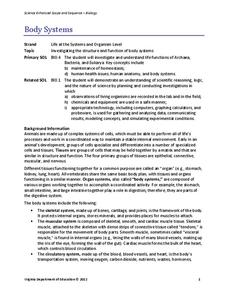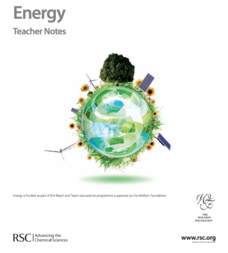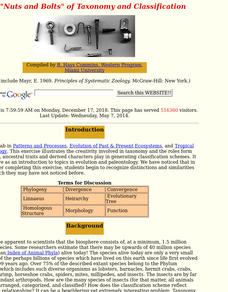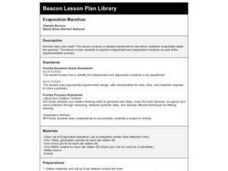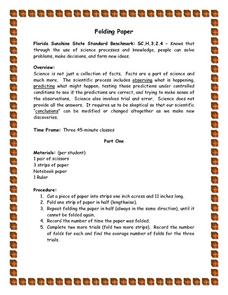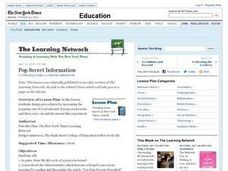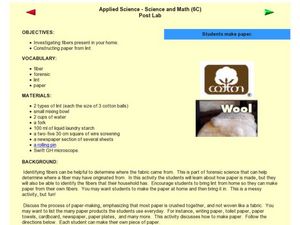Virginia Department of Education
Body Systems
The human body is an amazing thing! Explore the body with your high school class as they investigate each system in detail. They learn components of each organ system and disease processes that can negatively affect general health and...
Royal Society of Chemistry
Energy—Gifted and Talented Chemistry
What has more energy than a room full of pupils after a fire drill? This lesson plan! Explore the changes in energy during different chemical reactions, discover why some reactions feel cold and others feel hot, and tackle the concept of...
Odell Education
Plant and Animal Cells
Incorporate multiple facets of the cell into your next high school lab! Through an introduction to cell organelles, class members observe each cell type and draw visuals to further demonstrate understanding of cellular processes in both...
Chicago Botanic Garden
Plant Phenology Data Analysis
Studying data over time can paint a pretty interesting picture. Learners use data they collected in the previous lesson to compare to historical data in a similar region. They graph the data of the first bloom of a specific species over...
Curated OER
The "Nuts and Bolts" of Taxonomy and Classification
Students develop classification scheme that meets the established rules of the Linnaean system. They write one page essay on classification choices.
Curated OER
Farming Fantastic Friends
Seventh graders demonstrate scientific inquiry to design and perform an experiment involving Grow Creatures. They participate in a class discussion, and in small groups design an experiment that determines how to change the materials to...
Curated OER
Evaporation Marathon
Students review the steps of the scientific method and participate in a three day experiment. They observe water evaporation over time.
Curated OER
CSI, Second Grade Style
Second graders conduct a classroom investigation. In this investigative lesson, 2nd graders spend their time observing, measuring, and collecting data. They simulate a forensic science lab by conducting a fingerprint, scent, footprint,...
Curated OER
Surface Tension
Students study surface tension and determine if soap and heat will affect surface tension. In this tension lesson students complete a lab, make a hypothesis and answer questions.
Curated OER
Pendulum Lab in 9th Grade Physical Science
Ninth graders conduct experiments to determine what affects the rate of a pendulum's swing. Working in small groups, they identify an independent variable to study and create an experiment to test their hypothesis. When tests are...
Curated OER
Using the Scientific Method to Determine Which Conditions Best Favor Plant Growth
Seventh graders examine how the environment can affect biological processes. They identify the best conditions for the germination of bean seeds. They record and analyze their data. They write about their observations in an essay.
Curated OER
What's the Attraction?
Students experiment with magnets to determine the distances at which they attract and repel each other.
Curated OER
Study of Fossils
Fifth graders dig for fossils. In this fossil lesson, 5th graders read about the oldest found fossils and discuss the process of fossilization. They dig for their own fossils in a fossil box made of several dirt layers.
Curated OER
The Effect of Natural Selection on Genes, Traits and Individuals
Rotating through five stations, evolutionary biologists explore the question of how changes in DNA facilitate the changes in a population over time. High-quality, colorful cards of animals, skeletons, skulls, and DNA sequences can all be...
Curated OER
Hatching Chickens
Students observe chickens hatching in a classroom incubation environment In this egg-hatching lesson plan, students make observations of the hatching process and later care for the hatched chickens.
Curated OER
Holy Starbucks Batman
Students investigate caffeine as a potential new pollutant in a northwest river system. Effects of caffeine on invertebrates and salmon fry will be explored through field work and lab work.
Curated OER
Antibiotic Resistance
Students using the scientific method, study bacteria as a covering surface of the earth in many forms. They discover that not all bacteria is bad and introduce the topic of antibiotic resistance. Science Fair expectations are addressed.
Curated OER
Folding Paper
Learners use the scientific process and their knowledge to obeserve, predict, and test their predictions under controlled conditions to verify their predictions and then make sense of these predictions. They also graph, write...
Curated OER
Manipulate Sound Waves
First graders use the scientific process to investigate sound in the classroom and at home. They participate in several hands-on activities exploring sound. They then are introduced to sound vocabulary such as muffled, sharp, and tinkling.
Curated OER
Aquifer Model
Students, after researching and brainstorming about aquifers and locating aquifer maps of Texas, participate in the building of a model of an aquifer complete with a pumping station. They also answer a variety of questions at the...
Curated OER
Water Resource Engineering
Learners examine solubility and the significance of water. In this aqueous solution instructional activity students complete a lab activity on soil profiles.
Curated OER
Using Abiotic and Biotic Parameters to Monitor Air Quality
Students identify the abiotic factors that influence a river or stream and the organisms that live in it. They measure several abiotic and biotic parameters to gauge water quality. Students examine the biotic environment by identifying...
Curated OER
Pop Secret Information
Students design procedures for increasing the popping rate of a set amount of popcorn kernels. They propose and test a "secret" addition to the corn popping procedure which they expect would increase the popping rate and then write lab...
Curated OER
Applied Science - Science and Math (Post Lab)
Learners explore science. In this create science lesson, students come up with their own science experiment. They use their basic knowledge of hypothesis and procedure to come up with an experiment. This lesson includes background...


